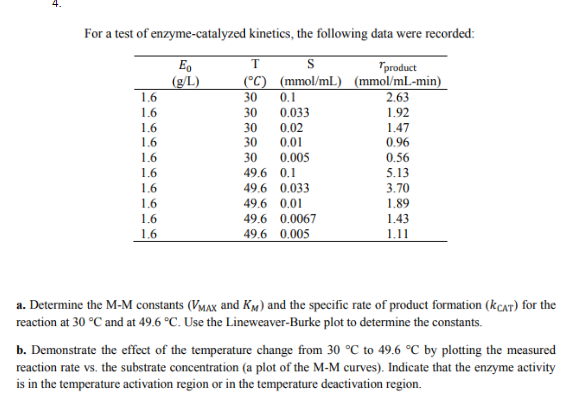For a test of enzyme-catalyzed kinetics, the following data were recorded product (mmol/mL) (mmol/mL-min) 30 0.1 0 0.033 30 0.02 30 0.01 30 0.005 49.6 0.1 9.6 0.033 49.6 0.01 9.6 0.0067 49.6 0.00:5 2.63 1.92 1.47 0.96 0.56 5.13 3.70 1.89 1.43 1.6 1.6 1.6 a. Determine the M-M constants (MAx and KM) and the specific rate of product formation (kCAT) for the reaction at 30 °C and at 49.6 °C. Use the Lineweaver-Burke plot to determine the constants. b. Demonstrate the effect of the temperature change from 30 °C to 49.6 oC by plotting the measured reaction rate vs. the substrate concentration (a plot of the M-M curves). Indicate that the enzyme activity is in the temperature activation region or in the temperature deactivation region.
For a test of enzyme-catalyzed kinetics, the following data were recorded product (mmol/mL) (mmol/mL-min) 30 0.1 0 0.033 30 0.02 30 0.01 30 0.005 49.6 0.1 9.6 0.033 49.6 0.01 9.6 0.0067 49.6 0.00:5 2.63 1.92 1.47 0.96 0.56 5.13 3.70 1.89 1.43 1.6 1.6 1.6 a. Determine the M-M constants (MAx and KM) and the specific rate of product formation (kCAT) for the reaction at 30 °C and at 49.6 °C. Use the Lineweaver-Burke plot to determine the constants. b. Demonstrate the effect of the temperature change from 30 °C to 49.6 oC by plotting the measured reaction rate vs. the substrate concentration (a plot of the M-M curves). Indicate that the enzyme activity is in the temperature activation region or in the temperature deactivation region.
Introduction to Chemical Engineering Thermodynamics
8th Edition
ISBN:9781259696527
Author:J.M. Smith Termodinamica en ingenieria quimica, Hendrick C Van Ness, Michael Abbott, Mark Swihart
Publisher:J.M. Smith Termodinamica en ingenieria quimica, Hendrick C Van Ness, Michael Abbott, Mark Swihart
Chapter1: Introduction
Section: Chapter Questions
Problem 1.1P
Related questions
Question

Transcribed Image Text:For a test of enzyme-catalyzed kinetics, the following data were recorded
product
(mmol/mL) (mmol/mL-min)
30 0.1
0 0.033
30 0.02
30 0.01
30 0.005
49.6 0.1
9.6 0.033
49.6 0.01
9.6 0.0067
49.6 0.00:5
2.63
1.92
1.47
0.96
0.56
5.13
3.70
1.89
1.43
1.6
1.6
1.6
a. Determine the M-M constants (MAx and KM) and the specific rate of product formation (kCAT) for the
reaction at 30 °C and at 49.6 °C. Use the Lineweaver-Burke plot to determine the constants.
b. Demonstrate the effect of the temperature change from 30 °C to 49.6 oC by plotting the measured
reaction rate vs. the substrate concentration (a plot of the M-M curves). Indicate that the enzyme activity
is in the temperature activation region or in the temperature deactivation region.
Expert Solution
This question has been solved!
Explore an expertly crafted, step-by-step solution for a thorough understanding of key concepts.
This is a popular solution!
Trending now
This is a popular solution!
Step by step
Solved in 8 steps with 11 images

Recommended textbooks for you

Introduction to Chemical Engineering Thermodynami…
Chemical Engineering
ISBN:
9781259696527
Author:
J.M. Smith Termodinamica en ingenieria quimica, Hendrick C Van Ness, Michael Abbott, Mark Swihart
Publisher:
McGraw-Hill Education

Elementary Principles of Chemical Processes, Bind…
Chemical Engineering
ISBN:
9781118431221
Author:
Richard M. Felder, Ronald W. Rousseau, Lisa G. Bullard
Publisher:
WILEY

Elements of Chemical Reaction Engineering (5th Ed…
Chemical Engineering
ISBN:
9780133887518
Author:
H. Scott Fogler
Publisher:
Prentice Hall

Introduction to Chemical Engineering Thermodynami…
Chemical Engineering
ISBN:
9781259696527
Author:
J.M. Smith Termodinamica en ingenieria quimica, Hendrick C Van Ness, Michael Abbott, Mark Swihart
Publisher:
McGraw-Hill Education

Elementary Principles of Chemical Processes, Bind…
Chemical Engineering
ISBN:
9781118431221
Author:
Richard M. Felder, Ronald W. Rousseau, Lisa G. Bullard
Publisher:
WILEY

Elements of Chemical Reaction Engineering (5th Ed…
Chemical Engineering
ISBN:
9780133887518
Author:
H. Scott Fogler
Publisher:
Prentice Hall


Industrial Plastics: Theory and Applications
Chemical Engineering
ISBN:
9781285061238
Author:
Lokensgard, Erik
Publisher:
Delmar Cengage Learning

Unit Operations of Chemical Engineering
Chemical Engineering
ISBN:
9780072848236
Author:
Warren McCabe, Julian C. Smith, Peter Harriott
Publisher:
McGraw-Hill Companies, The